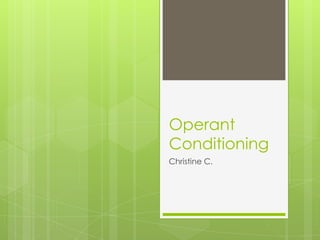Learning theories christine c
•Download as PPTX, PDF•
1 like•171 views
Module 13: Learning Theories. :
Report
Share
Report
Share

Recommended
Practical, Appropriate, Empirically-Validated Guidelines for Designing Educat...

Practical, Appropriate, Empirically-Validated Guidelines for Designing Educat...Lincoln Social Computing Research Centre
Recommended
Practical, Appropriate, Empirically-Validated Guidelines for Designing Educat...

Practical, Appropriate, Empirically-Validated Guidelines for Designing Educat...Lincoln Social Computing Research Centre
More Related Content
What's hot (7)
Viewers also liked
Viewers also liked (10)
Similar to Learning theories christine c
Similar to Learning theories christine c (20)
EDUC 108-BEHAVIORISM TO CONNECTIONISM-REYCHEL GAMBOA.pptx

EDUC 108-BEHAVIORISM TO CONNECTIONISM-REYCHEL GAMBOA.pptx
PART 1The term self fulfilling prophecy was defined by the Ame.docx

PART 1The term self fulfilling prophecy was defined by the Ame.docx
Operant Conditioning Benefits In A Pre-K Environment

Operant Conditioning Benefits In A Pre-K Environment
Learning theories christine c
- 2. B.F Skinner Skinner made many contributions to different concepts of psychology. One of the ideas he contributed was operant conditioning.
- 3. Operant Conditioning describes learning that is controlled and results in shaping behavior through the reinforcement of stimulus-response patterns.
- 4. The Experiment Skinner conducted an experiment that included pigeons. When they would behave how he wanted he would reward them. Soon, he was able to teach the pigeons things by rewarding them.
- 5. Real Life Skinner believed that people shape their behavior based on the rewards or positive reinforcement they receive. He observed that when children tried to make sounds, parents would smile and reinforce their behavior. The children would learn to say the word correctly and parents would reinforce their behavior.
- 6. How to use in your classroom: When your students are doing math problems, if they answer correctly you can give them a piece of candy. If your student uses a vocabulary word in the correct context, you can give them an extra credit point.
- 7. Operant Conditioning and Technology Many forms of computer-based instruction and education software are based off of operant conditioning. For example, when the correct answer is given, the software provides positive verbal and visual feedback.
- 8. Personal Opinion I believe that operant conditioning is a great way to teach students. Positive reinforcement is a beneficial concept to use for education purposes. I plan on using operant conditioning in my classroom and using the positive to help my students.
- 9. Credits: Teachers Discovering Computers: Integrating Technology in a Connected World 7th Edition. Shelly Cashman Series Google Images